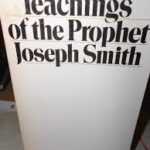What Just Happened?
I want to talk about that place we find ourselves when, for one reason or another, we have become disillusioned with the group we have been with. Perhaps We’ve begun to doubt and question the teachings we once held to be true and our own doubts unsettle us. Maybe we still go along, but with an attitude of caution, apprehension. Maybe we have already walked away but don’t know what to do now. It’s a place where we begin to look back and ask, ‘What just happened?’ Where we begin to ask, ‘What happens next?’ I assure you, you are not alone.
 It’s that place many find themselves, where we have lost the certainties that once sustained, assured, defined us, but we are still suspicious of what might be out there. After all, haven’t we always been taught that the Christian churches, ‘Christendom,’ have it seriously wrong? Early in my Mormon experience I was taught all the churches were wrong:
It’s that place many find themselves, where we have lost the certainties that once sustained, assured, defined us, but we are still suspicious of what might be out there. After all, haven’t we always been taught that the Christian churches, ‘Christendom,’ have it seriously wrong? Early in my Mormon experience I was taught all the churches were wrong:
‘…all their creeds were an abomination in [God’s] sight; that those professors [those who professed the creeds of Christendom] were all corrupt; that ‘they draw near to [God] with their lips, but their hearts are from from [him], they teach for doctrines the commandments of men, having a form of godliness, but they deny the power thereof.”(Joseph Smith-History 1:19)
Mormons are still taught this today. It’s a foundational principle on which everything else is built.
Jehovah’s Witnesses are taught something similar. Churches are portrayed for Jehovah’s Witnesses as increasingly liberal, corrupt, and dying as a consequence. The second president of the Watchtower Society, Joseph Rutherford, in 1939, famously described religion as, ‘a snare and a racket.’ Jehovah’s Witnesses have always looked on all other religions, particularly the churches, with the deepest suspicion. They would have you believe they alone have the truth. Of course, the Mormons make the same claim.
There is an implicit power in such a narrative, a power outsiders fail to appreciate or understand. If I put a gun to your head and demand you do as I say that is explicit power. If, on the other hand, I convince you that ‘out there’ all kinds of people have all sorts of weapons and the only safe place is with me that is implicit power. If I tell you that should you defy me I will dis-fellowship you, cast you out into that threatening world, that is the ultimate sanction. It has a surprisingly powerful hold on people who have fallen under it’s influence. If we embrace the narrative of the group we effectively hand over control to those who control the group.
We see such control in several tragic cases that marked the latter part of the twentieth century. It led to the infamous mass suicides/murders of 900 men, women, and children in Jonestown in 1978 by ingesting potassium cyanide mixed into a vat of punch and tranquillizers. We see it in the 1993 siege of the Branch Davidian compound in Waco, Texas, in which 76 people died. It is there in the Heaven’s Gate suicides in which 39 died, expecting to ascend to a spaceship hiding behind the Hale Bopp comet.
Such control lays a heavy burden on those who question the group, especially on those who leave. Moving on can seem an impossible task, and ‘ex-‘ members will look over their shoulders every day, anticipating that terrible consequence they were warned about. Generations of Mormons have been taught ‘those who leave the church never prosper.’ The immediate threat to a Jehovah’s Witness is shunning, an absolute cutting off from the society, even by family members; a total loss of your complete social group. Yet people leave. Every day they leave, and I am convinced God gives them strength to confront their doubts, ask their questions, and brave the consequences.
People in this position, of leaving but not yet arriving, often find themselves conflicted. They may be described, in the words of Matthew’s gospel, as, ‘harassed and helpless, like sheep without a shepherd.’ (Mt.9:36) Matthew tells us Jesus had compassion on these shepherd-less sheep. I am convinced Jesus will have compassion on them.
‘I am the good shepherd; I know my sheep and my sheep know me-just as the Father knows me and I know the Father-and I lay down my life for the sheep.’(Jn.10:14-14)
My conviction is that those who are sheep without a shepherd are precious to Jesus. He looks on them with compassion. He laid down his life for them and wants them to know him. It is our ambition that they should know him. Our aim is to help them come into that knowledge.
Confidence in God’s Word
In our experience at Reachout, any group that seeks to gain and keep your loyalty must first undermine the claims made by the Christian Church. They can’t do this by directly attacking the Bible on which Christian claims are founded. They, after all, claim to be a restoration of Christian truth, based on a corrected understanding of the same Bible. They, therefore, build a picture of the Bible having been corrupted in how it is used and translated. The Mormon 8th article of faith states:
‘We believe the Bible to be the word of God as far as it is translated correctly; we also believe the Book of Mormon to be the word of God.’
The Book of Mormon portrays the Bible as unreliable, corrupted:
‘For behold, they have taken away from the gospel of the Lamb many parts which are plain and precious; and also many covenants of the Lord have they taken away. And all this have they done that they might pervert the right ways of the Lord, that they may blind the eyes and harden the hearts of the children of men.’(1 Nephi 13:26-27)
Immediately, the Mormons’ trust in the Bible is qualified, subject to doubt and question, while no such qualification applies to the Book of Mormon. How, then, are Mormons to come to a true understanding of the Bible? Only through the Mormon Church.
The Watchtower Society takes a similar position:
‘The Bible is an organizational book and belongs to the Christian congregation as an organization, NOT TO INDIVIDUALS, regardless of how sincerely they may believe that they can interpret the Bible. For this reason the Bible cannot be properly understood without Jehovah’s visible organization in mind.’(WT, October 1967, p.587)
‘Unless we are in touch with this channel of communication that God is using, we will not progress along the road of life, no matter how much Bible reading we do.’ (WT, February 15 1981, p.17)
Following Jesus’ famous ‘Bread of life’ sermon in John 6 we read when some ‘turned back and no longer walked with him…Jesus said to the Twelve, “Do you want to go as well?” Simon Peter answered him, “Lord, to whom shall we go? You have the words of eternal life…” (Jn.6:66-68)
It does seem, however, these organisations claim to have the words of eternal life. While Jehovah’s Witnesses honestly think themselves true Bible students, they are truly only students of Watchtower literature.
The Bible cautions us, ‘Make sure of all things; hold fast to what is fine.’ (1 Thess.5:21, NWT) In the same Bible, John insists:
‘Beloved ones, do not believe every inspired statement, but test the inspired statements to see whether they originate with God, for many false prophets have gone out into the world.’(1 Jn.4:1, NWT)
It is imperative we take the apostles seriously and test the claims of the organisation we have begun to doubt, perhaps have already left, and ask, ‘What just happened? What was that all about?’ More importantly, it is vital we begin to test the Christian claim that the Bible can be trusted, that we can pick it up, read it, and understand it for ourselves.
Believe me when I say I have walked this way, harboured serious doubts, asked probing questions, felt uncomfortable doubting where once I believed, apprehensive of where this may lead. The journey is challenging, but the reward far outweighs any struggles I had along the way.
What Does the Bible Say?
 When I was learning to read the Bible through Christian eyes I would sometimes bring my own ‘interpretation’ to the text. I would, effectively, make a Mormon argument. My teacher used to simply say, ‘But what does it say?’ and I would reply, ‘I know that’s what it says but this is what it means.’ To which he would respond, ‘Yes, but what does it say.’ This was very annoying, both for me and for him. Patience won in the end and the truth dawned that the Bible means what it says. We will look at two examples of this and you can decide for yourself whether the Bible means what the group says it means, or whether the Bible means what it says.
When I was learning to read the Bible through Christian eyes I would sometimes bring my own ‘interpretation’ to the text. I would, effectively, make a Mormon argument. My teacher used to simply say, ‘But what does it say?’ and I would reply, ‘I know that’s what it says but this is what it means.’ To which he would respond, ‘Yes, but what does it say.’ This was very annoying, both for me and for him. Patience won in the end and the truth dawned that the Bible means what it says. We will look at two examples of this and you can decide for yourself whether the Bible means what the group says it means, or whether the Bible means what it says.
John 1:4
‘…by means of him was life, and the life was the light of men.’(NWT)
‘In him was life, and the life was the light of men.’(ESV)
‘In him life was, and the life was the light of the men.’ (KIT)
Q. Why have the New World Translators used the phrase ‘by means of him‘ when it is absent from the original?
A. Because it supports their teaching of Jesus being a created being ‘through whom’ God does his work of creation. Jesus is, in this picture, a conduit of life, not a source of life.
Q. Does the original support this teaching?
A. No
Q. What is the correct translation telling us?
A. Look at the verses in the context of John’s complete prologue – vv1-18. (We will look at John 1:1 another time) What do we discover about Jesus in the prologue?
1. Jesus created everything (John 1:3; Col.1:15-17) He cannot be part of creation if, ‘All things came into existence through him, and apart from him not even one thing came into existence.’
2. This is because ‘in him was life.’ (v4) He is the source of life, not it’s conduit, not himself dependent on another for that life. Life through Christ is one of the great concepts of John’s Gospel, coming up 36 times. Jesus ‘raises the dead and gives them life’ (5:21); he describes himself as ‘the bread of life’ (6:35) he gives life to his followers (10:28). He describes himself as ‘the life’ (14:6) and he has authority in himself to lay down and take up his life (10:18)
3. Jesus is, ‘the true light that gives light to every sort man who comes into the world‘ (v9)
4. We are saved through faith in his name (v12) in the name of Jesus.
5. He dwelt among us (lit. ‘pitched his tent among us’) as God dwelt with Israel (Ex.258-9; 33:7)
6. He is unique in his glory (v.14) seen through his miracles (2:11) his authority (Mt.7:29; Jn.10:18) the transfiguration before Peter, James, and John (Mk.9:2-8)
What have we learned through this exercise?
1. That the Watchtower Society ‘translates’ the Bible with a bias, changing the text to fit their preconceptions.
2. That an honest study of the text in a reliable modern translation can take the ordinary seeker a long way to correcting this bias and to discovering the truth for themselves. We all need help to understand the Bible, but a growing confidence in our own ability to understand guards us from making the mistake of depending on people who claim exclusive access to God. It makes the knowledge we gain truly our own, and not something we simply parrot because we read it somewhere in a magazine, or study book.
James 1:5
‘If any of you lacks wisdom, let him ask of God, who gives generously to all without reproach, and it will be given him.’ (ESV)
When Mormons tell the story of Joseph Smith they say he was inspired by this text to seek God and ask ‘which of all the churches he should join.’ Building on this idea of simply ‘praying to know,’ they quote a verse from the Book of Mormon:
‘And when ye shall receive these things, I would exhort you that you would ask God, the Eternal Father, in the name of Christ, if these things are not true; and if ye shall ask with a sincere heart, with real intent, having faith in Christ, he will manifest the truth of it unto you by the power of the Holy Ghost.’(Moroni 10:4)
Not only has Mormonism added written revelation to the Bible, but personal revelation. The result is, what is felt to be true by the Holy Ghost takes precedence over what is known to be true from the Holy Bible. Yet prayer seems so right when we approach the subject of truth. There are, however, very clear texts in God’s word that warn us against taking this course.
John cautions us, ‘Beloved, do not believe every spirit, but test the spirits to see whether they are from God for many false prophets have gone out into the world.’ (1 John 4:1)
‘Do not despise prophecies,’ writes Paul, ‘but test everything, hold fast what is good.’(1 Thess.5:21)
How are we to test everything? The best example of this is found in Acts 17:
The brothers immediately sent Paul and Silas away by night to Berea, and when they arrived they went into the Jewish synagogue. Now these Jews were more noble than those in Thessalonica; they received the world with all eagerness, examining the Scriptures daily to see if these things were so. Many of them therefore believed…’(Acts 17:10-11)
Nowhere in the Bible does God tell us to seek truth by prayer. James’ injunction to ‘ask God’ is not for the purpose of seeking truth but to gain ‘wisdom.’ The people to whom he is writing already know the truth (James 1:1) and needed wisdom in the working out of the truth.
Jesus himself declared, ‘You search the Scriptures because you think that in them you have eternal life; and it is they that bear witness of me, yet you refuse to come to me that you may have life.’ (John 5:21) Here is the pattern, as followed by the Bereans. search the Scriptures to establish the truth of what is being preached, and believe in the One to whom they point.
Later in Acts 17 Paul finds himself in Athens, reasoning with the Jews in the synagogue and with people in the marketplace. He shared the message on Mars Hill with the philosophers gathered there. He spoke of the ‘Unknown God’ they worshipped, revealing that God’s identity as, ‘The God who made the world and everything in it, being Lord of heaven and earth…’ (v24) What he did not do is urge them to, ‘ask God, the Eternal Father, in the name of Christ, if these things are not true…’
What have we learned through this exercise?
1. That the founding narrative of Mormonism is based on a misunderstanding of what the Bible tells us about finding truth.
2. That an honest study of the text in a reliable modern translation can take the ordinary seeker a long way to correcting this and to discovering the truth in a biblical fashion. We all need help to understand the Bible but, like the Bereans, we need to grow in confidence in our own ability to understand these things for ourselves. This will guard us from making the mistake of depending on feelings, which we all know can be misleading. The Bible tells us, ‘the heart is deceitful above all things, and desperately sick.’ (Jer.17:9)
‘I know because I read it in the Bible,’ is much more reliable, and biblical, than, ‘I know because it feels right to me.’
In this way we have begun to learn to test truth claims against the reliable and trustworthy word of God. We may now grow in confidence in our ability to know for ourselves. We can begin to explain to ourselves what just happened, and decide for ourselves what happens next in light of what we know for ourselves from God’s word.


